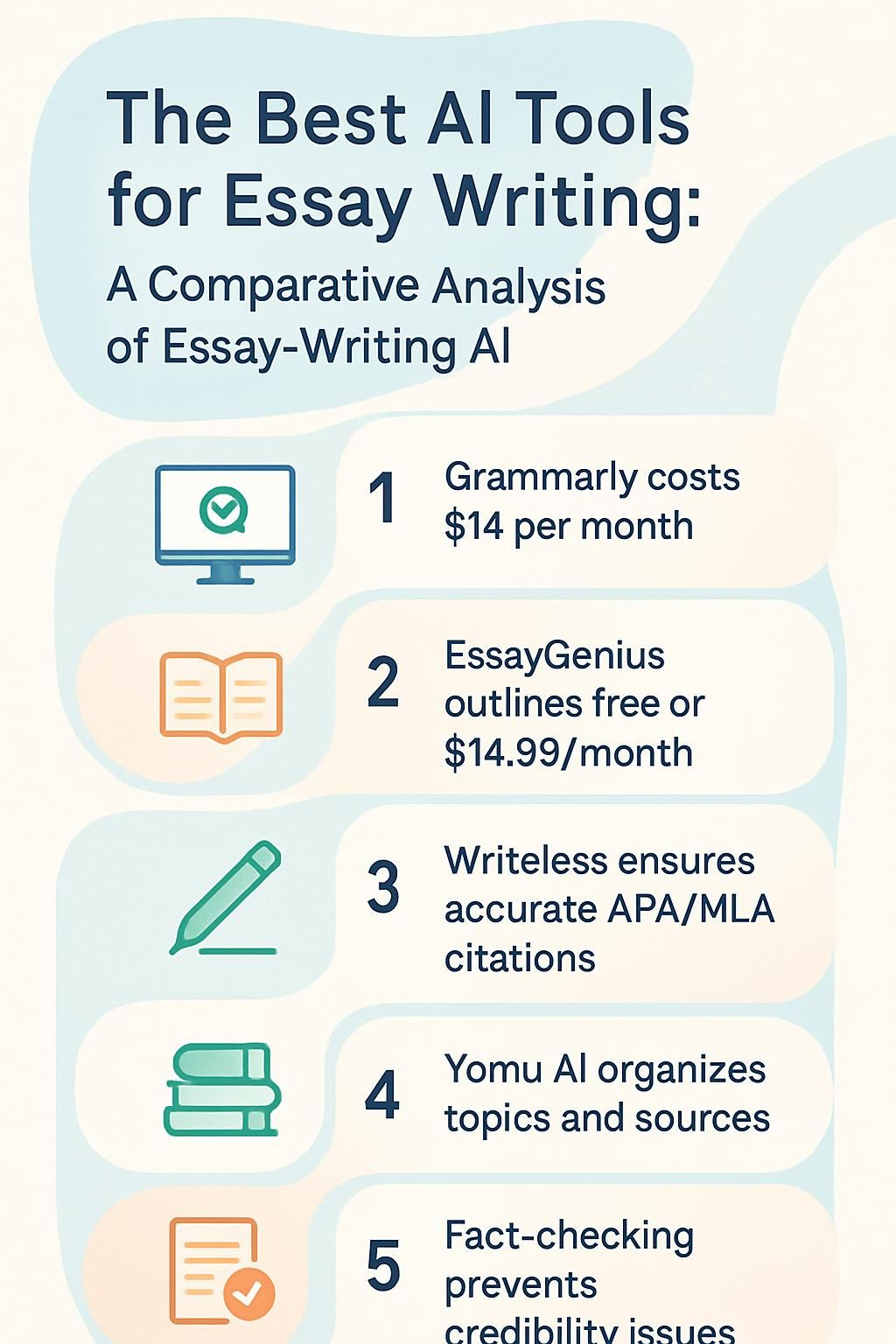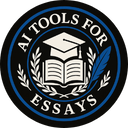Writing essays can feel hard, especially with deadlines looming. AI tools for essay writing are changing how students approach their tasks by making the process easier and faster. This blog will compare top tools like Grammarly and EssayGenius to help you choose the best one.
Keep reading to find your perfect essay helper!
Key Takeaways
- Grammarly excels in grammar fixes and style refinement. It costs $14 per month and improves academic writing clarity. However, it lacks citation tools.
- EssayGenius is best for creating essay outlines. It provides structured frameworks for essays and research papers with free outline creation or $14.99/month for full essays.
- Writeless offers accurate citations in formats like APA and MLA while ensuring plagiarism-free content, meeting academic standards efficiently.
- AI tools like Yomu AI help streamline research by suggesting sources, generating citations, and organizing complex topics quickly.
- Fact-checking is essential because some tools may produce inaccurate or outdated information that can harm essay credibility if unchecked.

Key Criteria for Evaluating Essay-Writing AI Tools
Choosing the right essay-writing AI tool can save time and improve your writing. The best tools focus on creating quality, original content while staying user-friendly.
Accuracy and relevance of content
AI essay writers must deliver accurate and relevant content to meet academic standards. Grammarly excels in grammar fixes but fails to add citations where needed. Cramly made errors by including fines and prison details that were not part of the original topic, lowering its reliability.
EssayGenius stood out by crafting a well-structured outline and ten detailed paragraphs aligned with the subject.
Accuracy in AI tools can make or break a research paper.
These tools should ensure research assistance matches assignment goals without straying off-track. Inaccurate facts harm the credibility of any essay generator, impacting trust for academic writing tasks like dissertations or literature reviews.
Plagiarism detection and originality
Plagiarism detectors like Turnitin and GPTZero help ensure academic integrity. They check research papers for copied content or AI-generated text. PerfectEssayWriter.ai provides plagiarism-checked essays, saving time while meeting academic standards.
Chegg also offers tools to verify originality post-writing.
Strong writing tools highlight unoriginal sections and suggest changes. This boosts credibility for research papers and literature reviews. Accurate detection prevents penalties from schools that value originality.
Next up is citation generation and formatting capabilities….
Citation generation and formatting capabilities
Chegg offers automatic citations, making it easier for students to meet academic standards. Yomu AI goes a step further with its Sourcely feature. This tool helps users find sources and format in-text citations accurately.
These features simplify creating literature reviews and research papers.
Grammarly does well with grammar but doesn’t include citation tools. Writeless stands out for ensuring perfect academic formatting and originality checks. Tools like these save time while boosting the quality of your work—next, learn about the top AI tools available this year!
Top AI Tools for Essay Writing in 2023
New AI tools make essay writing quicker and easier. Each tool has unique strengths that help with different tasks.
Grammarly: Best for grammar and style refinement
Grammarly works well for fixing grammar errors and improving style. The tool highlights mistakes in spelling, punctuation, and sentence structure. It also suggests tone adjustments like “Make it persuasive” or “Make it assertive.” This feature helps align your writing with academic standards.
A subscription costs $14 per month and includes unlimited access to features. Grammarly ensures essays meet academic integrity by refining content for clarity and polish. Move on to the next section to explore tools for creating structured essay outlines!
EssayGenius: Best for creating structured essay outlines
Grammarly sharpens writing, but EssayGenius organizes thoughts. This tool excels at creating structured essay outlines, saving time and effort. It provides a clear framework for essays with helpful subheadings like “historical background.” Students can use it to build outlines for research papers or literature reviews.
EssayGenius is free for outline creation. To generate up to 10 full essays, users pay $14.99 monthly or $144 yearly. Its pricing makes it accessible while offering premium features like organized ideas and academic standards alignment.
This tool helps meet assignment guidelines without stressing over structure.
Writeless: Best for academic citations and plagiarism-free content
EssayGenius helps with outlines, but Writeless excels in academic writing. It ensures accurate in-text citations and plagiarism-free content. With effective tools for research papers and literature reviews, it simplifies academic standards.
Writeless provides automatic citation formats customized to different styles like APA or MLA. Similar to Yomu AI’s Ethics Statement, it focuses on originality, ensuring work bypasses AI detectors effortlessly.
Enhancing Research with AI Tools
AI writing tools help streamline research for academic papers. Yomu AI, with its Intelligent Document Assistant, offers section suggestions and feedback. ChatGPT once generated a detailed outline on “21 U.S.C.
856″ to assist in legal analysis. These tools save time by quickly organizing complex topics.
EssayGenius acts as a strong starting point for research assistance. It creates essay outlines that guide deeper investigation into literature reviews or specific arguments. Such features ensure accuracy while maintaining academic integrity in research work.
Features That Set These AI Tools Apart
These tools stand out for their smart writing features and user-friendly designs. Each tool brings unique strengths, boosting essay quality in different ways.
Citation accuracy and formatting
Accurate citations are vital for academic writing. Writeless, known for meeting academic standards, excels in creating precise in-text citations. It ensures your references follow the correct format every time.
Chegg helps by generating automatic citations, saving time during research.
Yomu AI’s Sourcely simplifies citation formatting too. It finds sources and applies styles like APA or MLA with ease. PerfectEssayWriter.ai offers customizable formats, letting users adapt to specific assignment guidelines quickly.
These tools help maintain academic integrity while improving research papers and literature reviews efficiently.
AI detection bypass and human-like writing
Smooth citation formatting ties into another key feature: bypassing AI detectors while maintaining human-like writing. Tools like JotBot excel here by mimicking unique writing styles, even mirroring specific authors like Ellefson.
Users can upload past essays to train the tool, ensuring output feels personal and not machine-generated.
AI tools also help dodge detection systems such as GPTZero. These tools position themselves as research assistance platforms but maintain academic integrity by producing plagiarism-free content.
Their ability to craft natural-sounding text strengthens their use in creating original essays that align with academic standards.
Limitations of AI Essay-Writing Tools
AI essay-writing tools often miss the mark on citations. They struggle with generating accurate in-text citations or formatting them according to academic writing standards like APA or MLA.
This can lower the quality of research papers and harm academic integrity if not corrected manually. Sensitive topics also pose a challenge—tools may produce responses that are unclear, biased, or lack depth due to limited training data.
Another drawback is their learning curve. Some AI tools limit free usage to 10 credits daily, making them less accessible for students working on larger essays or literature reviews.
Features like dragging paragraphs or rejecting sentences sound helpful but require time and practice to use effectively. Moving forward, knowing how to enhance research using these tools can address some gaps while improving writing outcomes.
Tips for Using AI Tools Effectively in Essay Writing
Use AI tools to enhance your essay, but always review the output. Combine their strengths with your own knowledge for the best results.
Fact-checking and adding personal insights
Always verify the accuracy of content from an AI writing tool. These tools sometimes produce incorrect or outdated information. For example, they might misrepresent historical dates or use faulty logic in arguments.
Fact-checking helps you ensure your essay meets academic standards and keeps credibility intact.
Adding personal insights deepens your essay’s quality. It shows critical thinking and helps avoid over-relying on an essay generator. Share unique ideas, experiences, or opinions to enhance originality while maintaining academic integrity.
This practice also ensures alignment with assignment guidelines, which is crucial for success in research papers and other academic writing tasks.
Continue refining essays by reviewing them against instructions before submission.
Reviewing for alignment with assignment guidelines
Check if the essay meets academic standards. Compare it with the assignment rules given by your instructor or school. Look for required formats, word limits, and specific topics mentioned.
Ensure all in-text citations match the correct style, like APA or MLA.
Personalize automated drafts to fit guidelines better. Add personal ideas and insights to stand out and maintain academic integrity. Verify that AI tools like EssayGenius or Writeless generate accurate references without missing key sources.
Conclusion
Finding the right AI tool can make essay writing faster and easier. Tools like Grammarly, EssayGenius, and Writeless stand out for their distinct strengths. Each offers unique features to help with grammar, citations, or structuring ideas.
While helpful, these tools work best when paired with your own effort and knowledge. Use them wisely to create essays that are original and clear!


Leave a Reply